|
|
|
Sort Order |
|
|
|
Items / Page
|
|
|
|
|
|
|
| Srl | Item |
| 1 |
ID:
114224
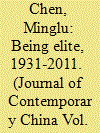

|
|
|
|
|
| Publication |
2012.
|
| Summary/Abstract |
Current interpretations of the People's Republic of China emphasize the discontinuities of 1949, and even 1978 to some extent. An examination of the experience of a Chinese family from 1931 to 2011 through three generations suggests that processes of elite formation are more complex and their interpretation might be more nuanced. In the process it highlights how one elite family managed to establish and maintain its elite status against a background of dramatic social change, and raises questions of the relationship between elite formation and the existence of a ruling class.
|
|
|
|
|
|
|
|
|
|
|
|
|
|
|
|
| 2 |
ID:
106785
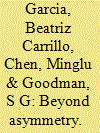

|
|
|
|
|
| Publication |
2011.
|
| Summary/Abstract |
Academic commentary has long emphasised the asymmetry in Mexico-China relations. In particular, much attention has focussed since the early 1990s particularly from the Mexican side on the economic imbalance in trade and investment that has become and remains acute with the expansion of the economy of the People's Republic of China. This is though far from the only sense in which the relationship between the two countries is asymmetrical. There is also a severe imbalance in the relative importance of politics and economics as determinants of this relationship for both China and Mexico. The Mexican Government seems to be more concerned with its economic relationship with China. In contrast, the PRC Government seems more concerned with its political relationship with Mexico. Moreover, there is a further asymmetry in the respective significance that each appears to have to the other as a partner. Mexico plays a small role in China's outlook but China looms large in Mexico's worldview. Identification of a number of cross-cutting asymmetrical relationships suggests that a bilateral perspective may not be the most effective for understanding the interaction or potential interaction between Mexico and China. On the contrary, there is more logic to the elements of cooperation and conflict between Mexico and China when their relationship is viewed in the wider, multilateral context of globalisation.
|
|
|
|
|
|
|
|
|
|
|
|
|
|
|
|
| 3 |
ID:
171086
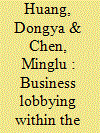

|
|
|
|
|
| Summary/Abstract |
Most existing scholarship regards private businesspeople in China as allies of the party-state, without considering how the private sector’s policy influence is possible in an authoritarian state where the political elites dominate the policy-making process. Based on the large number of successful proposals that the All-China Federation of Industry and Commerce (ACFIC) has submitted to the Chinese People’s Political Consultative Conference, this study reveals the rising policy influence of private businesspeople in the past decade. It finds that their influence on government policy is not realized simply through collusion or informal ties with local governments at the stage of policy implementation. Instead, they now can voice their interests and exert influence as a group in national policy making at the central level through formal institutional channels. In recent years the influence of business associations affiliated with the ACFIC has been increasing, mainly due to institutional changes at the national level that encompass their input. This entails political co-optation that helps empower the private sector to exert influence on policy, rendering it unnecessary for the business community to challenge the political system from the bottom up.
|
|
|
|
|
|
|
|
|
|
|
|
|
|
|
|
| 4 |
ID:
189044
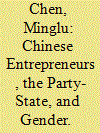

|
|
|
|
|
| Summary/Abstract |
In this article, we take a gender perspective to explore the relationship between private entrepreneurs’ business success and their Chinese Communist Party (CCP) membership. We theorize that, due to male-dominated CCP-business networks, female entrepreneurs are not able to leverage CCP membership into greater business success. Observable implications of this are that women will experience little or no business advantage from Party membership, while men will experience a significant advantage. The independence of women's business success from Party connections allows the possibility that women have carved out an area of autonomy from the party-state. Using a series of national entrepreneur surveys collected between 2002 and 2012, we assess the degree of empirical support for our expectations. We show that the CCP does appear to function as an exclusive “boys’ club” in terms of profitable patronage or networks, while the most successful women tend not to be Party members. The surveys also provide some evidence consistent with a CCP effort to recruit successful female entrepreneurs in order to curtail their autonomy. Our findings suggest non-CCP female entrepreneurs are a significant but generally overlooked socio-economic group with considerable potential autonomy.
|
|
|
|
|
|
|
|
|
|
|
|
|
|
|
|
| 5 |
ID:
139260
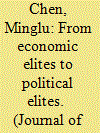

|
|
|
|
|
| Summary/Abstract |
The number of entrepreneurs in the system of People's Political Consultative Conferences (PPCC) has increased dramatically in the last two decades. Although the political importance of these local assemblies is usually dismissed, entrepreneur participation suggests a need for further investigation. Based on research on a city-level PPCC, this article seeks to interpret this phenomenon further. In the process of investigating private entrepreneurs' involvement in the PPCC, this article aims to re-examine the role of the local PPCC and to highlight private entrepreneur PPCC members' attitude to and expectations from the Party-state.
|
|
|
|
|
|
|
|
|
|
|
|
|
|
|
|
| 6 |
ID:
186941
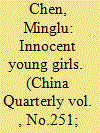

|
|
|
|
|
| Summary/Abstract |
There are few women among China's local political leadership. Current scholarship on the topic co-locates women's political participation with the representation of other marginalized social groups. In particular, it is argued that female politicians are simply tokenistic representatives of the marginalized: female, intellectual, ethnic minority and non-Communist Party members. An examination of those women who have served in provincial leadership positions over the last two terms suggests that such a characterization is misleading. Rather, the evidence indicates that women have been appointed on the same grounds as male leaders in terms of age, education, CCP membership and experience. Gender disparities in the selection of provincial leaders are in fact considerably more nuanced and can be traced to the lack of institutionalized policies and processes as well as women's ongoing disadvantages in education, political networks and training.
|
|
|
|
|
|
|
|
|
|
|
|
|
|
|
|
|
|
|
|
|